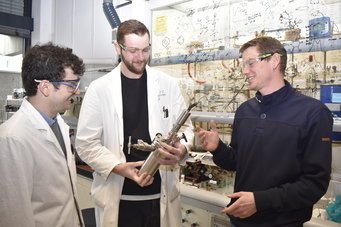The health needs of people living in rural and remote Australia differ greatly in comparison to their metropolitan counterparts.
Monash University
Access to healthcare, maldistribution of the health workforce, as well as the social determinants of health (such as education, employment, housing and social inclusion) all impact the ongoing health and wellbeing of regional communities.
Despite this, we know very little about the unique healthcare needs of people in rural Australia, because only 2.4% of the total National Health and Medical Research Council (NHMRC) funding in 2014 was allocated to rural health research, despite 30% of the Australian population residing outside major cities.
In a recent Medical Journal of Australia article, a group of rural health doctors, led by Dr Laura Alston, wrote a call to action to improve rural-based healthcare research.
The authors argue that building research capacity helps clinicians to provide better care, and health outcomes, for their patients: “… this is particularly important in rural and remote contexts, where health outcomes are notably poorer, and research environments are often less developed and more stretched.”
The development of DRIVERS
Three years ago, the Doctors for Regional Innovation, Vision, Excellence, Research and Scholarship (DRIVERS) conference was born out of an idea by Monash University’s Associate Professor Janelle Brennan to get junior doctors from Victoria’s Loddon Mallee region to lead an entire scientific conference, to showcase the breadth and output of rural health research and create a networking platform.
The organising and scientific committees, selected competitively from talented junior doctors, would design the program, invite speakers, host sessions, “basically driving – pun intended – the whole event, which is an enormous task, and a great introduction to leadership and training in the rigors of peer review of research”, Associate Professor Brennan, Director of Monash Rural Health’s North West Victoria Regional Training Hub, said.
While hosted by Monash University’s School of Rural Health, the DRIVERS conference is open to all regional and metropolitan medical students and healthcare workers with research relevant to rural medicine. The conference will be held in Bendigo, in person and online, on 23 September.
Addressing rural and remote health needs
Dr Jessica Paynter is a junior doctor at Bendigo Health, having graduated four years ago from Monash University. She grew up in the Loddon Mallee region and was part of the first DRIVERS conference, co-chairing the initial steering committee, and sees the conference as addressing the “unique health needs of remote and rural Australia, while also fostering the next generation of rural health researchers”.
In the MJA article, the authors recognise that in the past two decades “research activity has dramatically increased in rural and remote parts of Australia, largely through the success of university departments of rural health, rural clinical schools and regionally-focused research translation centres (RTCs), and an increased recognition of the importance of place-based approaches to research”.
According to Dr Paynter, this place-based research is exactly what the DRIVERS conference showcases.
This year there are 61 presentations, including 22 medical students addressing topics ranging from access to a survey of young cancer patients in regional Victoria, to an audit of category two caesarean sections at a rural hospital.
Last year, Dr Paynter and her colleagues presented a study of surgical transfer data from four rural Victorian hospitals, demonstrating that when rurally-based general surgeons had a broader scope or practice, there was less need to transfer surgical patients to metro hospitals.
She says it may seem obvious that the broader range of experience a surgeon has, the less need to transfer a patient to another hospital for treatment, “but until we actually have data that shows this to be true, it’s not possible to argue for broader training for surgeons in rural areas”.







